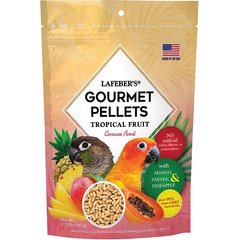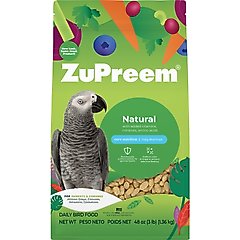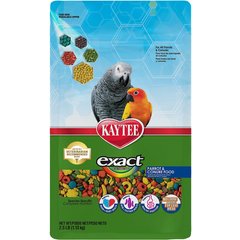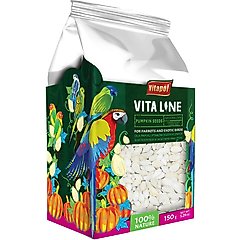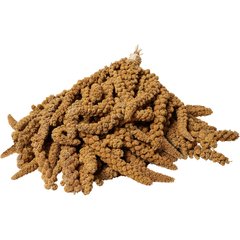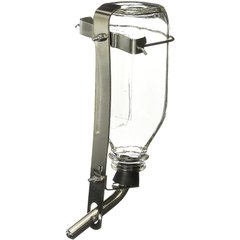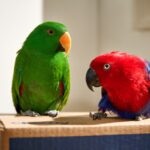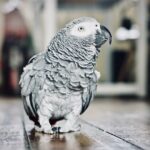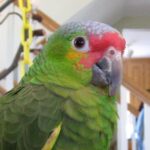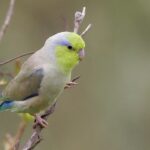What Do Parrots Eat?
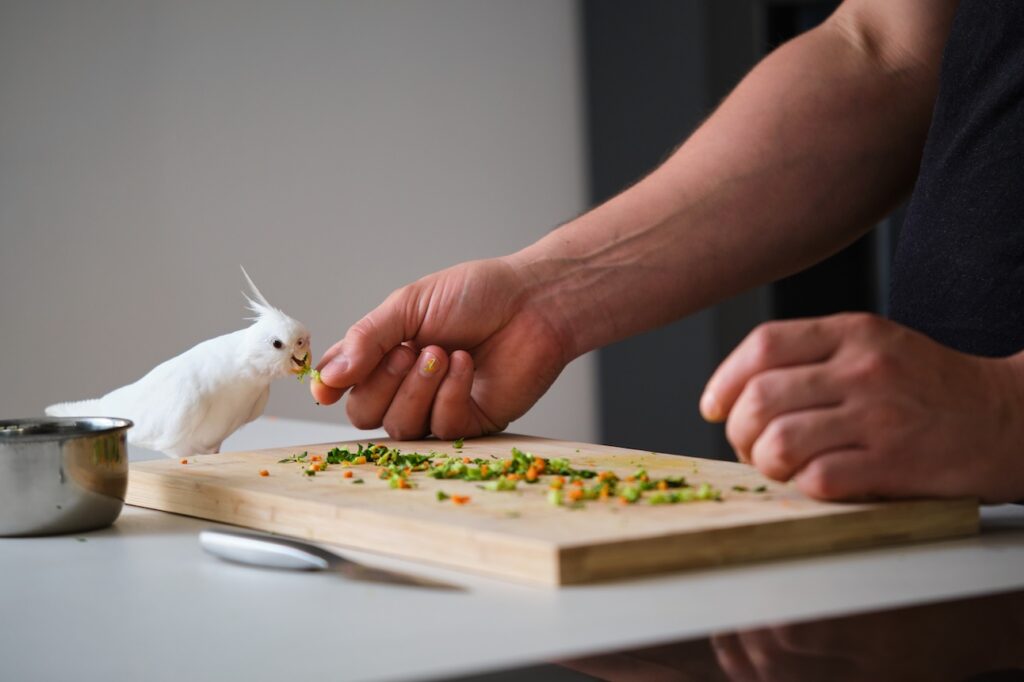
Photo by Ladanifer/Adobe
Polly want a … hmm. What do parrots eat, anyway?
We’ll give you a hint: it’s not crackers (at least, not on a regular basis). Like all pets, parrots need a well-balanced, nutrient-rich diet to live their happiest, healthiest lives. Here’s what to know about a parrot’s diet.
Key Takeaways
- Parrots need a balanced diet comprised of 60–80% formulated pellets and 20–40% fresh foods to stay healthy.
- Seeds and nuts can be offered as an occasional treat in a parrot’s diet.
- Parrots enjoy a wide range of fruits and veggies, but some are toxic and need to be avoided.
What Do Parrots Eat?
If you have a backyard bird feeder, you may associate “bird food” with a seed mix. While parrots do eat seeds, they enjoy a vast and varied diet in the wild, says Stephanie Lamb, DVM, president of the Association of Avian Veterinarians and a veterinarian at Arizona Exotic Animal Hospital in Phoenix, Arizona.
“There is so much more variety to what they eat in the wild than the standard seed mix that is offered in captivity,” Dr. Lamb says. “While it is true that parrots will eat seeds in the wild, it is not the only thing that they eat. They eat fruits and plant matter like flowers, leaves, and even bark. They eat soil, and some will take an occasional insect.”
As pets, parrots—including popular species such as African greys, macaws, and Amazons—don’t have access to the bountiful buffet of wild parrots.
But that’s where you come in. At home, a combination of formulated parrot food, seeds, and fresh fruits and vegetables is recommended for a balanced diet, Dr. Lamb says.
What To Feed Parrots
Every parrot is different, and veterinarians are still fine-tuning the best way to feed pet parrots. However, there are some general guidelines for a healthy diet, Dr. Lamb says.
“While we still have a lot to learn about parrot diets in captivity, it is generally suggested that a pet parrot get 60–80% of the overall diet as a formulated diet,” she says. “These provide a more balanced level of nutrients compared to certain types of diets like all seed-based diets. There are more appropriate ratios of proteins, fats, calcium, and vitamins like vitamin A.”
Formulated Diets
Similar to commercial dog or cat food, formulated parrot diets provide pet birds, like parakeets, cockatiels, and cockatoos, with a consistent balance of vitamins, minerals, carbohydrates, and proteins.
These pelleted diets are made from a variety of foods—including seeds, fruits, vegetables, and grains—baked and then extruded into shapes. Sometimes, whole seeds are mixed in.
Dr. Lamb recommends formulated diets that are purely pellets; this way, your parrot won’t be able to pick out favorites (specific seeds) and end up with an unbalanced diet that doesn’t meet their nutritional needs.
Recommended Products
Seeds
While seeds shouldn’t make up your bird’s entire diet, pet parrots can still enjoy them on occasion, Dr. Lamb says. Safe choices include:
- Pumpkin seeds
- Flax seeds
- Hemp seeds
- Chia seeds
- Millet
- Sunflower seeds
- Coriander seeds
- Milk thistle seeds
- Caraway seeds
Recommended Products
Because seeds are high in fat, they should be fed as an occasional treat, Dr. Lamb says.
“If you are a bird in the wild, flying around all day to get different resources and escape predators, you need lots of calories to fuel flight and all your activities,” she says. “Captive life usually calls for a lower energy need, which means that less fat and calories are needed in the diet than what is provided in seeds.”
Fruits and Vegetables
Fresh fruits and veggies provide parrots with essential nutrients and add important variety and excitement to mealtime.
“Twenty percent to 40% of the diet is recommended to be fresh-food items, such as organically grown and pesticide-free fruits and veggies,” Dr. Lamb says. Fruit and vegetables should be chopped into small pieces; they can be served mixed into formulated foods or seeds or served alone.
Parrots enjoy a wide variety of fresh food. Popular choices include:
- Bananas
- Apples (remove the seeds)
- Oranges
- Watermelon
- Papaya
- Pineapple
- Grapefruit
- Grapes (Note: If you have dogs, don’t feed your birds grapes. Parrots like to drop their food, and dogs may eat it up. Grapes are highly toxic to dogs.)
- Berries
- Apricot
- Kiwi
- Star fruit
- Pomegranate
- Dark leafy greens (kale, spinach, dandelion greens)
- Carrots (roots and tops)
- Sweet potatoes
- Peppers
- Green beans
- Broccoli
- Parsley
- Cilantro
- Sugar snap peas
- Squash
- Corn
- Cauliflower
Although raw veggies have the most nutritional value, some birds prefer the softer texture of cooked vegetables. If your parrot resists raw veggies, try lightly steaming them, then offer the same vegetable raw once your bird develops a taste for it.
Remove any remaining vegetables and fruit at the end of the day so your bird doesn’t eat moldy food.
Beans and Grains
Grains and beans offer a good source of protein, minerals, B vitamins, and carbohydrates. In addition to fruits and vegetables, cooked grains (including rice, quinoa, oats, wheat, and barley) and cooked legumes (such as beans, lentils, and peas) can be served as part of your parrot’s fresh-food allowance, Dr. Lamb says.
Foods To Avoid
Dr. Lamb says parrots should never be fed:
- Mushrooms: Common grocery varieties, such as white button, shiitake, and portobello, are generally considered safe. But never feed your bird wild mushrooms, which may be toxic.
- Onions: Contain sulfur compounds that can cause ulcers and other issues in parrots.
- Avocado: The pit, skin, and flesh contain persin, which is toxic to birds.
- Tomato: The acidity can upset a parrot’s digestive system.
- Chocolate: Contains theobromine and caffeine, which are toxic.
- Crackers and breads: An occasional treat is OK, but they offer little nutritional value.
- Meats: High-protein, high-fat diets can contribute to liver and cardiovascular disease in parrots.
- Uncooked beans: Present a choking hazard, and some varieties contain phytohemagglutinin, a toxin.
- Dairy: Can cause digestive upset in parrots.
- Alcohol and caffeine: Toxic to parrots.
How Much To Feed Your Parrot
A parrot’s caloric needs vary by species, age, sex, and health status, says Dr. Lamb. Work with your veterinarian to determine how much and how often to feed your feathered friend.
As a general guideline, here are some feeding recommendations:
- Conure: about 1 tablespoon per day
- African grey: about 2–2.5 tablespoons per day
- Cockatoo: about 3–3.5 tablespoons per day
- Macaw: about 3–5 tablespoons per day
“These are generalizations, though,” Dr. Lamb says. “Volumes will vary based on the calories in the formulated diet and the fresh items offered.”
In most cases, Dr. Lamb says, pet parrots with obesity are overfed by well-meaning caretakers.
“The most common mistake people make is feeding too much,” she says. “Food dishes are large and can fit several days’ worth of food. Measuring out a daily volume of food is best, because it helps to ensure your parrot is not over-indulging.”
Measuring food daily can also alert you when your parrot isn’t eating enough, which warrants a vet visit.
FAQs About Parrot Food
What do parrots eat the most?
Pet parrots should eat a diet that consists of 60–80% formulated pellets and 20–40% fresh foods such as fruits, vegetables, grains, and legumes.
What do parrots drink?
Parrots drink water and should always have access to a clean, fresh supply.
Most parrots drink from a water bowl. If your parrot dunks their food and makes the water dirty, consider a water bottle.
Recommended Product
Do parrots ever eat meat?
In the wild, some parrots will eat insects. However, pet parrots should not be fed meat. Diets high in protein and fat can lead to liver inflammation and cardiovascular disease.
What nuts are bad for parrots?
Parrots should never eat seasoned or salted nuts, and they should avoid raw peanuts, which can be contaminated with mold.
While many nuts, including cashews, walnuts, hazelnuts, macadamia nuts, almonds, Brazil nuts, pecans, and pistachios, are safe for parrots, they’re high in fat and should be an occasional treat.
